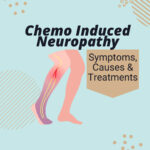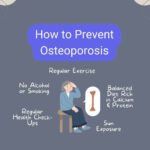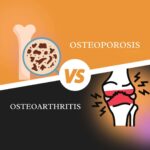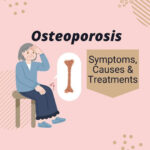Understanding Osteoporosis
Osteoporosis weakens bones, making them more prone to fractures and not to be confused with osteoarthritis. Strong bones are crucial for overall health and mobility. They provide structure, protect organs, and support muscles. Without strong bones, simple activities like walking or bending become challenging.
Poor bone health can lead to fractures and other complications. Simple falls can result in serious injuries for individuals with weak bones. This is why taking proactive steps to prevent osteoporosis is vital.
This blog post will explore how to prevent osteoporosis. We share strategies and lifestyle factors that both men and women should follow to reduce the risk of osteoporosis.
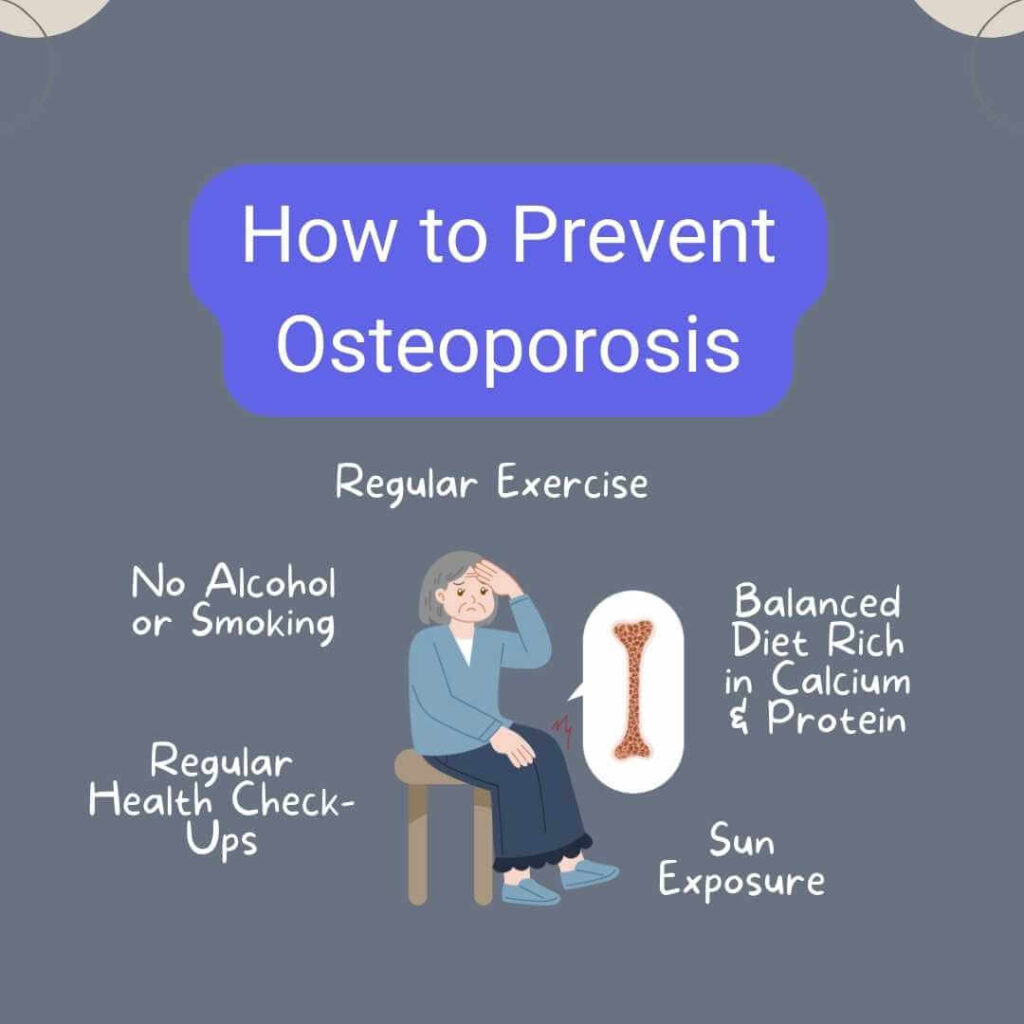
Effective Prevention Strategies
Regular Exercise Benefits
Engaging in weight-bearing exercises is crucial for building strong bones. Activities like walking, jogging, dancing, and hiking are excellent examples. These exercises help bones become stronger by working against the force of gravity.
The ideal exercise routine includes a combination of weight-bearing, resistance, and balance exercises every other day. For optimal bone health benefits, aim for at least 150 minutes of moderate-intensity aerobic activity per week. Incorporating strength training exercises two or more days a week is beneficial.
Weight-bearing activities help muscles work against gravity to support body weight while also stimulating bone-forming cells to build new bone tissue.
You do not need fancy equipment or a gym membership for this, making small changes in one’s daily routine such as taking the stairs instead of the elevator or going for a walk during lunch break can make a big difference in maintaining healthy bones.
Medications for Prevention
Various medications are available to prevent or slow down bone loss. It’s important to consult with a healthcare professional to determine if medication is necessary based on individual risk factors and medical history.
- Bisphosphonates: These medications help maintain or increase bone density.
- Hormone therapy: If you are a woman, this treatment option may be recommended for women after menopause who are at increased risk of osteoporosis.
- Selective estrogen receptor modulators (SERMs): They work by mimicking the effects of estrogen on bone density.
Nutrition for Bone Strength
Balanced Diet Essentials
Following a balanced diet is crucial for maintaining strong and healthy bones. Optimal calcium intake is essential, as it helps in building and preserving bone mass. Foods such as dairy products like milk, cheese, and yogurt, leafy greens like spinach and kale, as well as fortified foods like cereals are rich sources of calcium. Consuming food with enough calcium regularly can help ensure that the body gets an adequate amount of nutrients to support bone health.
In addition to calcium, the role of protein should not be overlooked. Protein plays a vital role in supporting muscle function and overall bone health. Including lean & good sources of protein in the diet such as poultry, fish, beans, and nuts can contribute significantly to maintaining healthy bones.
Vitamin D Importance
Vitamin D is another essential nutrient that supports calcium absorption and overall bone health. Sun exposure allows the body to naturally produce vitamin D; however, some individuals may require supplementation if they have limited sun exposure or if their bodies do not efficiently produce vitamin D.
Regularly checking vitamin D levels with a healthcare professional can help determine if supplementation is necessary for optimal bone health.
Healthy Habits for Bone Health
Sun Exposure Benefits
Limited sun exposure is beneficial for healthy bones as it helps the body produce vitamin D naturally. Spending time outdoors in the morning sun can maximize vitamin D synthesis. However, excessive sun exposure should be avoided, and it’s important to protect the skin with sunscreen.
Smoking and Alcohol Risks
Smoking poses a significant risk to healthy bones by increasing the likelihood of osteoporosis and fractures. Similarly, excessive alcohol consumption can have a negative impact on bone health. Therefore, quitting smoking and moderating alcohol intake are crucial steps in preventing osteoporosis.
Both smoking and drinking too much alcohol can harm your bones. They weaken them over time, making them more likely to break or fracture easily. That’s why it’s so important to quit smoking and limit how much alcohol you drink.
Professional Guidance and Support
Doctor Consultation
Consult with a healthcare professional to assess your risk factors for osteoporosis. Discuss any concerns or symptoms related to bone health with your doctor. Regular check-ups can help monitor bone density and overall health.
It’s important to consult with a doctor to understand the state of your bones, especially as you age. By regularly visiting a healthcare professional, adults can stay informed about their bone health and take proactive measures to prevent osteoporosis.
Seeking medical advice also allows individuals to address any underlying conditions that may contribute to osteoporosis, such as hormonal imbalances or vitamin deficiencies. This proactive approach empowers adults in taking control of their bone health and preventing potential issues in the future.
Simple Steps to Take Now
Red Light Therapy
Recent studies found that by increasing cellular metabolism, red light therapy can be a helpful tool in the question on how to prevent osteoporosis. In various clinical trials it could be shown that red light therapy as able to improve bone density and bone health in osteoporosis patients. Red light therapy also helps with symptom management, such as back pain relief and faster regeneration after falls.
Daily Habits for Prevention
People should maintaining a balanced diet. Foods rich in calcium, such as dairy products, leafy greens, and fortified cereals, are essential for bone health. Consuming enough protein helps maintain muscle mass and supports overall bone health.
Engaging in regular exercise and weight-bearing activities is a good idea. Activities like walking, jogging, dancing, or resistance training can help strengthen bones and muscles. On the other hand, avoiding smoking and limiting alcohol consumption are important steps to prevent osteoporosis. Practicing sun safety by wearing sunscreen when outdoors can also help maintain healthy levels of vitamin D.
Tracking Progress and Health
Keeping track of your daily habits can be beneficial. You should monitor your exercise routine, dietary habits, and any lifestyle changes you make to promote better bone health over time.
Regularly monitoring bone density through medical tests recommended by your doctor is another key step in preventing osteoporosis. By assessing progress regularly through these tests, you can stay motivated on your prevention journey while making necessary adjustments along the way.
Frequently Asked Questions
What is osteoporosis?
Osteoporosis is a condition characterized by weakened bones, making them fragile and more likely to break. It often progresses without any symptoms until a fracture occurs. Read our full article on Osteoporosis here.
How can exercise help prevent osteoporosis?
Weight-bearing and muscle-strengthening exercises can improve bone density and reduce the risk of fractures. Activities like walking, dancing, weight training, and yoga are beneficial for bone health.
What are some essential nutrients for preventing osteoporosis?
Calcium, vitamin D, magnesium, and vitamin K are crucial for maintaining strong bones. These nutrients support bone mineralization and overall skeletal health.
Are there simple steps that one can take now to prevent osteoporosis?
Yes! Start with regular weight-bearing exercises such as walking or jogging. Ensure a balanced diet rich in calcium and vitamin D from sources like dairy products, leafy greens & sunlight exposure.
- How To Improve Gut Microbiome – 26 May 2024
- Chemo neuropathy treatment: What to do? – 19 May 2024
- How to Prevent Osteoporosis: Effective Strategies & Simple Steps – 28 December 2023


